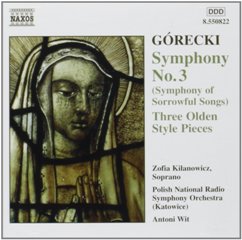Gorecki - Symphony of Sorrowful Songs - 3 Olden Style Pieces (1994)
Gorecki - Symphony of Sorrowful Songs - 3 Olden Style Pieces (1994)

Symphony No. 3, Op. 36 1. Movement 1 – Lento sostenuto tranquillo ma cantabile 2. Movement 2 – Lento e largo – tranquillissimo 3. Movement 3 – Lento cantabile semplice 3 Olden Style Pieces 4. I 5. II 6. III Zofia Kilanowicz, soprano Polish National Radio Symphony Orchestra Antoni Wit, conductor
Henryk Gorecki's Symphony No. 3 is a powerful, prayer-like setting of instrumental and vocal music. While considered a modern composer, the work is firmly rooted in the tonal world, often creating a mantra/meditative feel; the 1976 composition is as emotional today, as it was in its own time.
The subtitle "Sorrowful Songs" is lost a little in the Polish translation, where the sense of "Wordless song", "prayer and exhortation", and "elegiac and redemptive lullaby" are qualities involved in the literal translation. The unique orchestration (4 flutes, 2 piccolos, 4 clarinets, 2 bassoons, 4 horns, 4 trombones, harp, piano, and full string ensemble) give a full, rich, intimate, chamber sound, but the beauty of a solo soprano voice adds to the absolute quality of the instruments. In three movements, each conveys a prayer in a contrasting, yet peaceful manner. Ingeniously, the 26-minute first movement is dominated simply by a canon; based on a folk song, the tune is taken up by the double-basses in low tessitura, and each voice enters at a fifth. It begins rather muddy in the lower voices, but, the gently shifting, repetitious nature, as well as the natural crescendo (achieved by adding instruments and increasing register) comes to a powerful climax, of which the movement ends the opposite by subtracting voices. 13 minutes into the opening movement, the mood changes from the kaleidoscopic motion of shifting strings, to full chords, piano attacks, and a prayer sung by soprano over huge, lush string chords. The effects of the first movement are intriguing and intense, but highly satisfying. The nine-minute second movement's text was found on the wall of Cell No. 3 in "The Palace", a Gestapo's headquarters in Zakopane, written by an 18-year old imprisoned in 1944. Lush minor chords open the movement with a rising motive. Exclamation of "Mama, mama, do not weep" referring personally and religiously, is heartbreaking. Again, thick and lush string ensemble chords dominate the texture, but rather than the ever-moving canon of the opening, long sustained, slowly-shifting chords support the pleas of the soprano soloist; the movement ends unresolved. Equally heart-wrenching is the text of the third movement; a mother who fears her son has died at the hands of the enemy, and is buried in an unknown land, asks God's flowers to cover and protect her son. The soprano melody is simple and seemingly folk-based, but more active and dramatic than the preceding movement; feelings of hopelessness and utter sorrow are sincerely portrayed with the endless shifting string chords, which seem more sounds of unearthly, or ancient chordal movements. The 17-minute final movement and the whole work ends in A major, full of hopefulness and a feeling that all of our prayers have been received with the genuine sincerity in which they have been given.
David Zinman and the London Sinfonietta make this music sparkle, with a deep, velvety sheen. I do not feel that the work is overly sappy, but sincere and passionate performances. The sound is wonderfully resonant and speaks well; the orchestra plays magnificently and is captured well on recording. Dawn Upshaw is outstanding, both bright and luscious, she gives each movement a different mood, making the work a dramatic experience which unfolds, rather than a set of movements. David Zinman adds nothing that Gorecki doesn't ask for, and the composers' natural intent is given on this recording. Gorecki's music is engaging and in this case, broaches toward minimalism, rooted in tonality and modality, the prayer-like music never becomes boring or merely repetitious, but it all ends too soon. 15 years after the Zinman performance and 30 years after its composition, the work has an amazingly powerful statement and immense spirituality. A must-have recording. --- Brett A. Kniess, amazon.com
download: uploaded anonfiles yandex 4shared solidfiles mediafire mega filecloudio
Last Updated (Friday, 29 November 2013 17:54)








